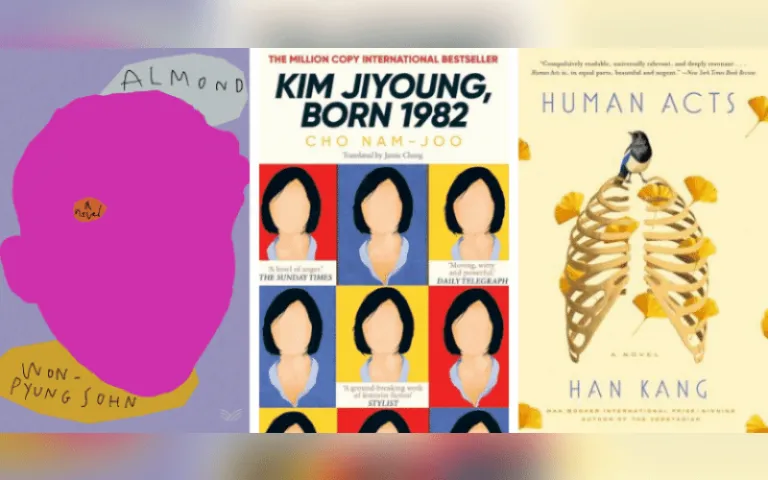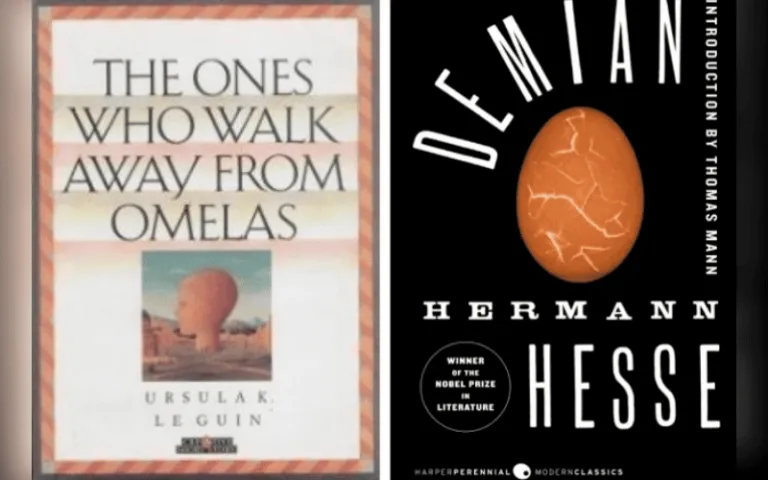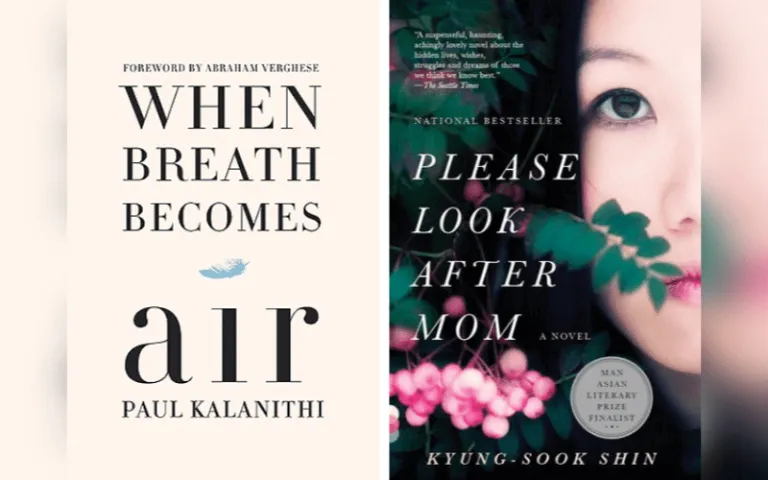The promise of new flavours beckons from Banawe.
I Read BTS RM’s Book Recommendations — Here’s What I Learned
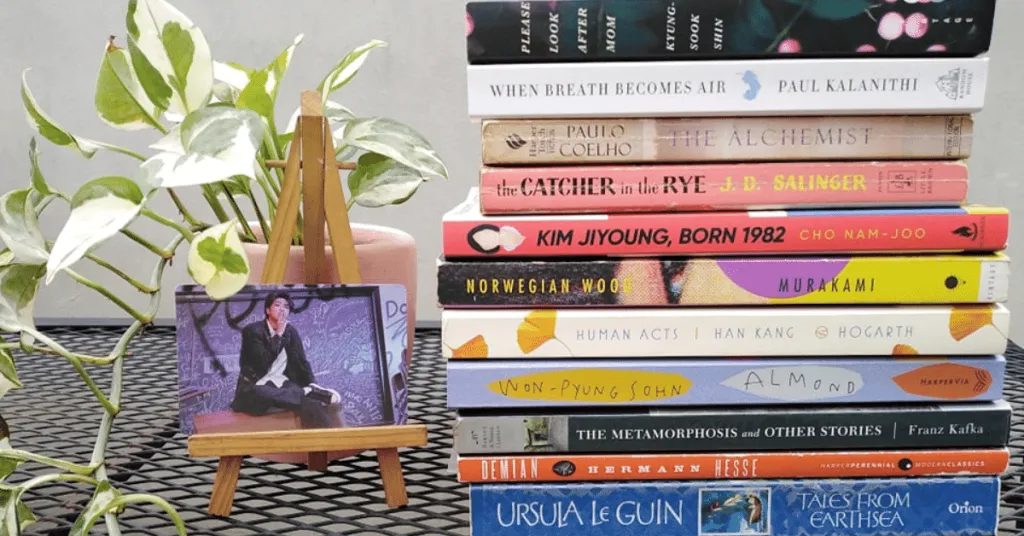
Stories of ARMY are some of the most diverse. My becoming started from a place you probably wouldn’t expect: BTS RM’s book recommendations.
Even in 2025, the impact of BTS leader RM continues to reach beyond music charts. As a self-confessed “baby ARMY,” my journey with BTS began not with a concert or music video, but through a quiet corner of the internet discussing Namjoon’s literary tastes. It all started when I was looking for new books by Asian authors — and stumbled upon RM’s well-loved reading list. Seeing familiar names like Haruki Murakami, Han Kang, and Ted Chiang sparked my curiosity. I dove in — and the rest, as they say, is history.
From that first book to now, RM’s thoughtful, wide-ranging reading choices have opened doors to new perspectives and deeper connections with BTS’ artistry. If you’ve been meaning to join the Namjoon book club, now might be the perfect time.
Also read: 10 Online Bookstores in the Philippines for Bookworms
Namjoon’s book recommendations: What I’ve read and what I learned
Norwegian Wood by Haruki Murakami
“If you only read the books that everyone else is reading, you can only think what everyone else is thinking.”
First of all: What better quote to jumpstart this list of RM’s book recommendations than this iconic line from Norwegian Wood? I’m certainly curious about what Namjoon’s thinking — he’s the leader of our beloved band, after all.
According to his reported book recommendations, Namjoon has read several Murakami books, namely: Kafka On The Shore, 1Q84, Killing Commendatore, and Norwegian Wood. Some ARMYs believe that aside from the blatant Kafka On The Shore allusion, the BTS song Butterfly (2015) also references Norwegian Wood:
My Kafka on the shore / Don’t go to those woods over there.
Like most Murakami books, Norwegian Wood is sprinkled with magical realism, eccentric concepts, and philosophical thought. It centres around Toru Watanabe’s life, where he reminisces about his life in the 1960s after hearing The Beatles’ eponymous song play again. Through his recollection, Watanabe brings us back to his college memories: falling in love, dealing with a best friend’s death, discovering sexuality, witnessing a revolution unfold, and falling in love again.
I read Norwegian Wood back in high school. It was my first exposure to magical realism, a genre I eventually grew fond of. While I wouldn’t necessarily recommend it to other underage ARMYs, I still believe the book is an interesting pick. Murakami’s style will definitely transport you to another dimension — just like how BTS songs do.
The Catcher in the Rye by JD Salinger
Back in college, The Catcher in the Rye was a novel that seemed to understand me. It tells the story of a young man, Holden Caulfield, who explores adolescence and all its perils. He deals with depression, alienation, teenage angst, identity crises, and a struggle for personal independence.
And in case you missed it: BTS’ Danger (2014) music video features a copy of The Catcher in the Rye sitting on Namjoon’s desk. The music video also, coincidentally or not, shows adolescent boys dancing with angst in what seems to be an underground train station.
 Image credit: BTS (방탄소년단) ‘Danger’ Official MV
Image credit: BTS (방탄소년단) ‘Danger’ Official MV
Some K-ARMYs also point out that the Run (2015) music video shows a scene where V stands in a room which walls are vandalised with a translated quote from The Catcher in the Rye:
“The mark of the immature man is that he wants to die nobly for a cause, while the mark of the mature man is that he wants to live humbly for one.”
These are just a couple of references we can assume to be connected; several more theories surround the BTS Universe; but as you may already know, that’s another topic for another day.
Almond by Won-pyung Sohn
“There is no such person who can’t be saved. There are only people who give up on trying to save others.”
For a reader who enjoys the visuals of book covers, I immediately became interested in Almond the first time I saw it. But when I saw RM read it, then watched Suga suggest in In the SOOP (2020) that it’s a well-written book, my decision was sealed: I had to buy it.
Indeed, Almond’s narrative is as colourful as its vibrant cover. It follows the story of Yunjae, a young boy diagnosed with alexithymia, a psychiatric condition that makes it hard for him to recognise his emotions. Coping with this all his life, Yunjae strives to deal with grief, friendship, and even romance in his own way. He meets unlikely friends and mentors, and he uncovers what it is like to grow up.
Almond is a quick and easy read, and it’s a great book if you want to start exploring translated authors. It tells a story from a refreshing perspective while still retaining the familiarity of Asian culture; and, it reminds us of our moral obligation to love one another as we continue to learn how to love ourselves.
Kim Ji-young, Born 1982 by Cho Nam Ju
“While offenders were in fear of losing a small part of their privilege, the victims were running the risk of losing everything.”
Astonishingly straightforward, Kim Ji-young, Born 1982 tells the story of its namesake. Protagonist Ji-young is incredibly average: She bears a common Korean name and lives an ordinary Korean life. That’s the point.
In her critically acclaimed book, Cho Nam Ju shares the voice of South Korean women who time and again face the aches and discomforts of being born a woman. Set across different timelines — from the 1980s to the 2010s — Kim Ji-young, Born 1982 also presents how South Korea developed and progressed, and how it, in many ways, did not.
As a globally famous Korean boy band, BTS has undoubtedly dealt with a misogynistic world that would go as far as misgendering them for their emotional transparency and style preferences. With this, it’s unsurprising that this feminist book made it to RM’s book recommendations. The rapper even called it “thought-provoking” in one of his live broadcasts.
Of course, almost a decade in the industry, BTS doesn’t have a perfect record as far as sexism goes; but with their recent songs, statements, and advocacies, the members have definitely proven themselves as our allies.
Human Acts by Han Kang
“Is the dignity that we cling to nothing but self-delusion, masking from ourselves the single truth: that each one of us is capable of being reduced to an insect, a ravening beast, a lump of meat? To be degraded, slaughtered — is this the essence of humankind, one which history has confirmed as inevitable?”
In a live broadcast, Namjoon revealed that when he read Human Acts, he “felt overwhelmed because the author wrote so well. It was very impressive.”
Set across different periods, Human Acts follows the effects of Gwangju Uprising through the lenses of seven characters. Jumping from one narrator to the next, the book’s seven chapters each brings in new perspectives; but Han cohesively ties these stories together through a teenage boy named Dong-ho, whose tragic death served as a painful reminder of Gwangju’s struggle against South Korea’s martial law government in May 1980.
Having read a couple of her books before, my respect for Han grew even deeper after reading Human Acts. I don’t take in factual details well; so, historical fiction really helps me process historical events, as it provides me with the freedom to visualise without bounds.
Cleverly weaving her poetic voice with explicit scenes of violence, Han narrated Gwangju Uprising with such eloquence, candour, and gentleness. The book enlightened me about the pivotal moment of South Korea’s democracy; later, I learned that this is the exact event J-Hope raps about in Ma City (2015):
I’m Gwangju’s hoshigi, the country’s 8 provinces gear up / If you want to see me then gather at 7 / Everyone dial it, 062 – 518
J-Hope, born and raised in Gwangju himself, talks about 062-518 — the first three digits are Gwangju’s area code; the last three is a commemoration of the day Gwangju Uprising started: 5-18 is 18 May.
The Ones Who Walk Away From Omelas by Ursula K. Le Guin
“They leave Omelas, they walk ahead into the darkness, and they do not come back.”
Among Namjoon’s book recommendations, The Ones Who Walk Away From Omelas is probably the shortest book; but that doesn’t undermine its huge impact. The book is set in the utopian city of Omelas: it has the richest resources and the happiest citizens. All is perfect in this paradise; but, its impeccability is sustained through the tragedy of one child. Locked in a basement, this child experiences misery day by day: kept in the darkness, fed with barely enough, cleaned alongside its own waste.
Once old enough, citizens of Omelas learn about this child. Then, they’re confronted with a moral dilemma: Must they help it and therefore sacrifice the happiness of the rest of the city? Or must they choose to forget and ignore its existence, so that other children can grow up in perfection? Some citizens choose to walk away from Omelas, but no one knows what lies ahead.
 Image credit: BTS (방탄소년단) ‘봄날 (Spring Day)’ Official MV
Image credit: BTS (방탄소년단) ‘봄날 (Spring Day)’ Official MV
In their famous Spring Day (2017) music video, BTS evidently references Omelas as the inn from which the members walk away at the end. The song itself discusses several issues and themes, one of them seemingly being the political philosophy of utilitarianism, which Le Guin’s story shares as well. Both the story and the BTS song ask: For the sake of our own happiness, should we turn a blind eye to the tragedies happening around us?
Demian by Hermann Hesse
“Good that you ask — you should always ask, always have doubts.”
Probably the most famous book referenced by BTS, Demian is widely known among ARMY as the book to inspire the Wings (2016) concept. And unlike with the other books which we can only assume that BTS’ songs allude to, RM particularly revealed that their album was heavily influenced by Demian — from their lyrics and jacket photos to their short films and music videos.
Demian follows the life of Emil Sinclair, a young boy raised in a traditional, middle-class home. He lives his childhood in a bubble, where an illusion of goodness prevails. Later, he meets Max Demian, who challenges him to confront his identity, values, and faith.
This book is a philosophically stimulating read and I coursed through it with an open mind. Although I disagree with most of its worldviews, I appreciate how the book emboldened me to think and reflect on what I believe in.
I was also undoubtedly fascinated with how correlated the narrative was to the Wings album. Every short film in Wings carries a line from the book, which leads me to think that these lines mark the chapters the respective songs correspond to. This said, while there are countless Demian references in Wings, I particularly enjoyed Jin’s seeming portrayal of Sinclair through the Blood Sweat & Tears (2016) music video the most.
BTS undoubtedly did an excellent job of storytelling in Wings. Like the central theme of Demian, this era also shows how the band dealt with an awakening after going through the most beautiful moment in life. As Big Hit notes, Wings is about how the boys “break out of their shells and try to take flight for the first time.”
When Breath Becomes Air by Paul Kalanithi
“Science may provide the most useful way to organise empirical, reproducible data, but its power to do so is predicated on its inability to grasp the most central aspects of human life: hope, fear, love, hate, beauty, envy, honour, weakness, striving, suffering, virtue.”
After a long list of fiction books, I finally grabbed my first memoir from RM’s book recommendations. Pulitzer Prize finalist When Breath Becomes Air is a posthumous autobiography of Paul Kalanithi, a neurosurgeon committed to understanding the meaning of life. Peppered with epiphanies, his memoir speaks about his life as a medical student, a doctor, and finally, a patient.
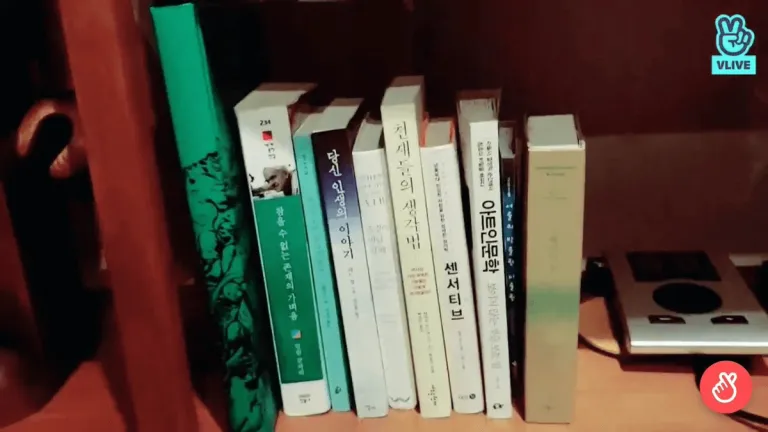 Image credit: V LIVE
Image credit: V LIVE
I’m fascinated with how, even in nonfiction, RM enjoys books with a philosophical note. While, as far as I know, the BTS leader never made any remarks about this particular memoir, it’s still evident that it ties in with his interests: After all, there are several BTS songs with themes that explore the meaning and purpose of life.
Notably, When Breath Becomes Air isn’t the only memoir written by a neurosurgeon in RM’s book recommendations. Into the Magic Shop, the book that famously inspired crowd-favourite Magic Shop (2018), was written by James R. Doty, a clinical professor in the Department of Neurosurgery at Stanford University. (Unfortunately, this book was out of stock when I wanted to buy it; but I hope to read it someday.)
Please Look After Mom by Shin Kyung-sook
“Only after Mom went missing did you realize that her stories were piled inside you, in endless stacks. Mom’s everyday life used to go on in a repeating loop, without a break. Her everyday words, which you didn’t think deeply about and sometimes dismissed as useless when she was with you, awoke in your heart, creating tidal waves.”
On a live broadcast in 2017, RM and V talked about Please Look After Mom. V shared that he’d read it after a fan recommended it to him. Although the vocalist doesn’t remember much about the book, he nevertheless noted that it has strikingly relatable lines.
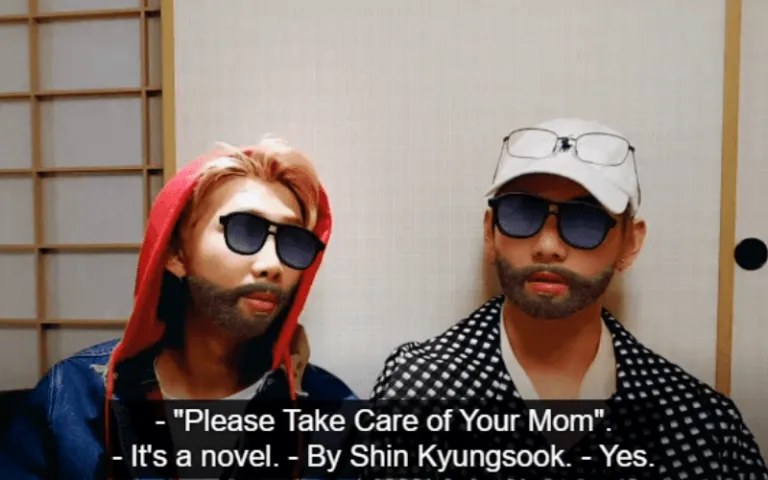 Image credit: V LIVE
Image credit: V LIVE
Indeed, Please Look After Mom draws on a theme relatable to most: the constant, sacrificial love of a mother. The book starts with 69-year-old So-Nyo, a wife, mother, and grandmother, disappearing among the crowds of the Seoul subway station. After that starts the long and gruelling process of her family searching everywhere for her.
Shifting from past to present tense, the sentimental story explores the memories So-Nyo shared with each of her family members. As her husband, children, and in-laws look for her, they also look back at how her presence has shaped each of their lives. They realise how they’ve taken her for granted; they deal with grief, guilt, regret, and self-discovery.
Full list of BTS RM’s book recommendations
Beyond these nine books, Namjoon has a lot more book recommendations. As of 2021, here’s a good starting list, as translated by Cari Cakes.
Essays
11pm by Hwang Kyeongshin
One Bite, Elephant by Hwang Kyeongshin
Convenience Store Illustrations by Lee Mikyeong
When Breath Becomes Air by Paul Kalanithi
I Want to Die But I Want to Eat Ddeokbokki by Baek Sehui
Glad to Live Like Bonobono by Kim Shinhoi
Novels
Norwegian Wood by Haruki Murakami
Kafka on the Shore by Haruki Murakami
1Q84 by Haruki Murakami
Killing Commendatore by Haruki Murakami
Almost Transparent Blue by Ryu Murakami
Kitchen by Banana Yoshimoto
The Unbearable Lightness of Being by Milan Kundera
Me Before You by Jojo Moyes
Humans Acts by Han Kang
Kim Jiyoung Born 1982 by Cho Nam Joo
The Hitchhiker’s Guide to the Galaxy by Douglas Adams
Stories of Your Life (and others) by Ted Chiang
Poetry
In This Short Time by Jeong Hoseung
We Are From Which Star by Jeong Hoseung
To Daffodils by Jeong Hoseung
If I Had Known What I Know Now by Ryu Shihwa
Love Like You’ve Never Been Hurt by Ryu Shihwa
Seoul by Ha Sangok
Classics
The Stranger by Albert Camus
Nietzsche’s Writings
Demian by Herman Hesse
The Metamorphosis by Franz Kafka
1984 by George Orwell
Nature by Ralph Waldo Emerson
Humanities/social studies
Broad and Shallow Knowledge for Intellectual Dialogue by Chae Sajang
How To Live by Yu Shimin
Justice: What’s the Right Thing To Do? by Michael Sandel
Breaking Out of The “Man Box” by Tony Porter
The Noonday Demon by Andrew Solomon
Nobody Can Hurt Me Without My Permission by Bärbel Wardetzki
Art Humanities by Kim Taejin
Music: A Very Short Introduction by Nicholas Cook
A History of Pictures by Martin Gayford
How Geniuses Think by Theresa Bäuerlein
Also read: K-Pop Merch PH: Where to Buy Official Merchandise
Without a doubt, RM’s list of book recommendations will continue growing through the years. In fact, the BTS leader still frequently shares snaps of books he enjoys with ARMY through his official social media pages.
 Image credit: RM on Weverse
Image credit: RM on Weverse
Reading is Namjoon’s form of relaxation; but as we can see in his lyrics, it’s very likely that RM also leverages this hobby to widen his perspective and spark his creativity. After all, the most meaningful music is created not just by the most talented, but also by the most sincere musicians.
Have you read any of Namjoon’s book recommendations? Maybe you’ve read books recommended by other BTS members, too. Share your thoughts in the comments section — we’d love to hear what you’ve learned!
Published at
About Author
Danielle Uy
Subscribe our Newsletter
Get our weekly tips and travel news!
Recommended Articles
10 Best Banawe Restaurants for a Mouthwatering Food Trip in QC 14 Best Credit Cards for Travel in the Philippines The only plastic we need for travel.
10 Commandments for Responsible Travel Flexing Spread the good word!
10 Creative Hangout Spots Around Metro Manila for Artsy Souls Looking for a place to meet fellow artists and thinkers? Here are 10 collaborative spaces in Metro Manila where creatives can hang out, brainstorm, and build ideas.
10 Tips for Planning Out-of-Town Trips During Typhoon Season Stay safe and travel well during the rainy season.
Latest Articles
Philippines Among the World’s Friendliest Countries – US News 2025 Ranking Learn why Filipino hospitality makes every trip unforgettable.
Best Attractions of Southeast Asia That Delight Both Kids and Seniors These top attractions in Southeast Asia offer scenic views, easy access, and calm experiences for the whole family.
Halal Town Manila: Quiapo Set to Become a Muslim-Friendly Food and Culture Hub Manila is about to get more muslim-friendly!
Italian Cuisine Earns UNESCO Status as Intangible Cultural Heritage Food with culture
MMDA Urges Malls to Limit Sales as Marcos Highway Traffic Worsens Commuters are frustrated, but is this really the solution to heavy traffic?


